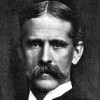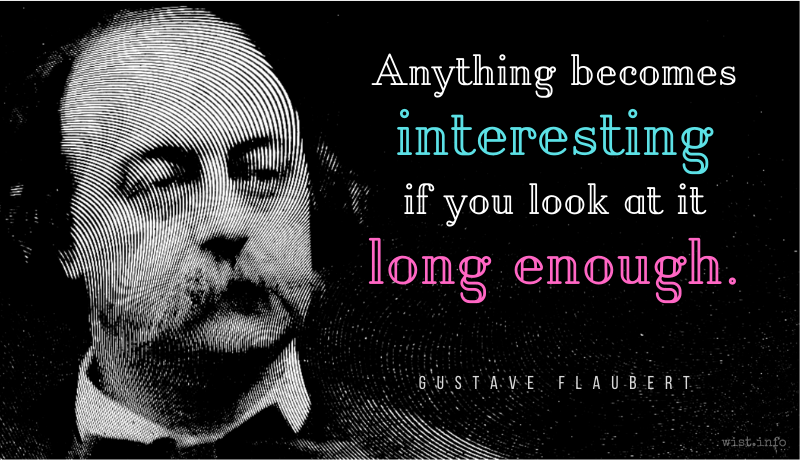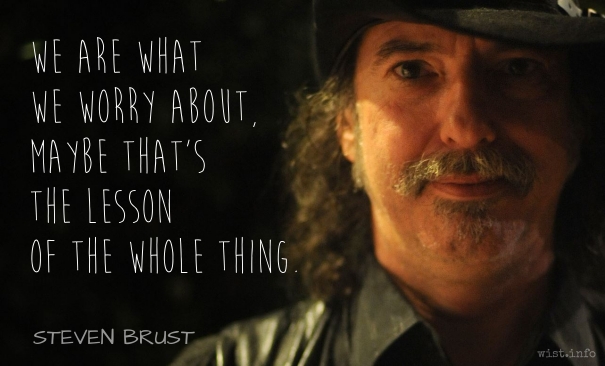Men can be unjust, because it is in their interest to act so, and they prefer their own satisfaction to that of others. They always act with themselves in mind. No one is gratuitously wicked; there must be a determining cause, and it is always one of self-interest.
[Les hommes peuvent faire des injustices, parce qu’ils ont intérêt de les commettre et qu’ils préfèrent leur propre satisfaction à celle des autres. C’est toujours par un retour sur eux-mêmes qu’ils agissent: nul n’est mauvais gratuitement; il faut qu’il y ait une raison qui détermine, et cette raison est toujours une raison d’intérêt.]
Charles-Lewis de Secondat, Baron de Montesquieu (1689-1755) French political philosopher
Persian Letters [Lettres Persanes], Letter 84, Usbek to Rhédi (1721) [tr. Healy (1964), # 83]
Montesquieu's argues that an omnipotent God must be just, because God has no interest that cannot be satisfied through injustice.
(Source (French)). Alternate translations:
Men may commit injustice, because it is in their interest to do it, and they chuse rather to satisfy themselves and others. It is always with an eye to themselves that they act: no body is wicked gratis: he will have some reason to sway him; and that reason is always a reason of interest.
[tr. Ozell (1760 ed.)]
Men may do injustice, because it is in their interest to commit it, and because they prefer their own private satisfaction to that of others. It is always with a view to themselves that they act: nobody is wicked for nothing: he must have some reason that determines himl and this reason is always a reason of interest.
[tr. Floyd (1762), # 83]
Men act unjustly, because it is their interest to do so, and because they prefer their own satisfaction to that of others. They act always to secure some advantage to themselves: no one is a villain gratis; there is always a determining motive, and that motive is always an interested one.
[tr. Davidson (1891)]
Men act unjustly, because it is their interest to do so, and they prefer their own satisfaction to that of others. In acting they always have in view the effect their action will have on themselves: no one is bad for nothing; every one must have a determining motive, and that motive is self-interest.
[tr. Betts (1897)]
Men can commit injustices, because it is in their interest to do so, and they would rather satisfy themselves than others. It is always through thinking of themselves that they act unjustly; no one is gratuitously bad, there must be a reason which determines the act, and that reason is invariably one of self-interest.
[tr. Mauldon (2008)]
Men are capable of injustice, because their self-interest leads them toward it, and because they prefer their own satisfaction to that of others. Everything always revolves around themselves. No evil is ever done gratuitously, for there is always a reason behind it, and that reason is always one of self-interest.
[tr. MacKenzie (2014), # 83]
Quotations about:
interest
Note not all quotations have been tagged, so Search may find additional quotes on this topic.
Elitism is repulsive when based upon external and artificial limitations like race, gender, or social class. Repulsive and utterly false — for that spark of genius is randomly distributed across all cruel barriers of our social prejudice. We therefore must grant access — and encouragement — to everyone; and must be increasingly vigilant, and tirelessly attentive, in providing such opportunities to all children. We will have no justice until this kind of equality can be attained. But if only a small minority respond, and these are our best and brightest of all races, classes, and genders, shall we deny them the pinnacle of their soul’s striving because all their colleagues prefer passivity and flashing lights? Let them lift their eyes to hills of books, and at least a few museums that display the full magic of nature’s variety. What is wrong with this truly democratic form of elitism?
Stephen Jay Gould (1941-2002) American paleontologist, geologist, biologist
Dinosaur in a Haystack: Reflections in Natural History, Part 5, ch. 18 “Cabinet Museums: Alive, Alive, O!” (1995)
(Source)
To science, not even the bark of a tree or a drop of pond water is dull or a handful of dirt banal. They all arouse awe and wonder.
Jane Jacobs (1916-2006) American-Canadian journalist, author, urban theorist, activist
Dark Age Ahead, ch. 4 “Science Abandoned” (2004)
(Source)
WYATT: Do you think that philosophy contribute to happiness?
RUSSELL: Yes, if you happen to be interested in philosophy and good at it, but not otherwise – but so does bricklaying. Anything you’re good at contributes to happiness.
Bertrand Russell (1872-1970) English mathematician and philosopher
Interview by Woodrow Wyatt, BBC TV (1959)
Collected in Bertrand Russell's BBC Interviews (1959) [UK] and Bertrand Russell Speaks His Mind (1960) [US].
Just as eating contrary to the inclination is injurious to the health, study without desire spoils the memory, and it retains nothing that it takes in.
Leonardo da Vinci (1452-1519) Italian artist, engineer, scientist, polymath
MS. 2038, Bib. Nat. 34 r. [tr. McCurdy (1908)]
(Source)
Call me a scoundrel, only call me rich!
All ask how great my riches are, but none
Whether my soul is good.[ἔα με κερδαίνοντα κεκλῆσθαι κακόν]
Euripides (485?-406? BC) Greek tragic dramatist
Bellerophon [Βελλεροφῶν], frag. 181 (Nauck, TGF) (c. 430 BC) [tr. Gummere (1925)]
(Source)
Barnes frag. 65. Found (in Latin) in Seneca, Epistulae morales ad Lucilium, 115.14:
Sine me vocari pessimum, ut dives vocer.
An dives, omnes quaerimus, nemo, an bonus.
(Source (Greek)). Alternate translations:
If any gain ensue, I am content.
To be term'd wicked. We all ask this question,
Whether a man be rich, not whether virtuous.
[tr. Wodhull (1809)]
Let me be called a scoundrel, but a rich one.
We all ask if he’s rich, not if he’s good.
[Source]
Modest egoism is the salt of conversation; you do not want too much of it, but if it is altogether omitted, everything tastes flat.
Henry Van Dyke (1852-1933) American clergyman and writer
“The Ristigouche from a Horse-Yacht,” Little Rivers (1895)
(Source)
I have always thought that all the theories of what a good play is, or how a good play should be written, are futile. A good play is a play which, when acted upon the boards, makes an audience interested and pleased. A play that fails in this is a bad play.
Maurice Baring (1874-1945) English man of letters, writer, essayist, translator
Have You Anything to Declare? (1936)
(Source)
Ours is not the only story, just the most interesting one.
Mignon McLaughlin (1913-1983) American journalist and author
The Second Neurotic’s Notebook, ch. 4 (1966)
(Source)
By Art and Nature, if thou well recall
How Genesis begins, man ought to get
His bread, and make prosperity for all.
But the usurer contrives a third way yet,
And in herself and in her follower, Art,
Scorns Nature, for his hope is elsewhere set.[Da queste due, se tu ti rechi a mente
lo Genesì dal principio, convene
prender sua vita e avanzar la gente;
e perché l’usuriere altra via tene,
per sé natura e per la sua seguace
dispregia, poi ch’in altro pon la spene.]Dante Alighieri (1265-1321) Italian poet
The Divine Comedy [Divina Commedia], Book 1 “Inferno,” Canto 11, l. 106ff (11.106-111) [Virgil] (1309) [tr. Sayers (1949)]
(Source)
In Genesis (Gen. 2:15, 3:17-19), God ordains humanity is to survive gathering plants and resources (Nature) and through toil and "the sweat of his face" (Art or Industry) . Usurers are deemed evil because they gain wealth from interest on money-lending (or, by extension, any financial investments), producing money from money, not from productive work. They are considered in Dante's scheme as bad as blasphemers and perverts, and worse sinners than murderers or suicides. See commentary from Sayers and Durling.
(Source (Italian)). Alternate translations:
And if you recollect
Your Genesis, you'll know that from these two
Mankind should Life, Tillage the Earth receive.
But, because Us'ry takes another way,
Despising Nature and your daughter Art,
It God displeases, and incurs his wrath.
[tr. Rogers (1782), l. 101ff]
But from her hallow'd path the Miser strays,
Who lets pale A'rice warp his sordid ways,
Invet'rate foe to Nature's simple lore,
Beneath his influence grows the barren gold.
He speaks, and lo! the parent sums unfold
In monstrous births, a misbegotten store.
[tr. Boyd (1802), st. 16]
These two, if thou recall to mind
Creation’s holy book, from the beginning
Were the right source of life and excellence
To human kind. But in another path
The usurer walks; and Nature in herself
And in her follower thus he sets at nought,
Placing elsewhere his hope.
[tr. Cary (1814)]
Both these to man, if thou refresh thy mind
In Genesis' early writ, the Word ordains
His life to foster, and advance his kind.
But other way takes Usance to his gains,
And, choosing other hope, a scornful war
With Nature and her handmaid Art maintains.
[tr. Dayman (1843)]
By these two, if you recallest to thy memory Genesis at the beginning, it behoves man to gain his bread and [to prosper].
And because the usurer takes another way, he contemns Nature in herself and in her follower, placing elsewhere his hope.
[tr. Carlyle (1849)]
From these two, if right considered in the mind,
From first of Genesis the truth receive,
Life and advancement to the nations gave.
But usury has ta'en another way,
Despising nature and her handmaid Art,
Far other hopes his light of life impart.
[tr. Bannerman (1850)]
From these two, then, if thou in mem'ry hold'st
The earlier Genesis, it is decreed
That life must spring, and man's increase must come.
But then the usurer treads another path;
Nature and her attendant both he scorns,
Since in another means he places hope.
[tr. Johnston (1867)]
From these two, if thou bringest to thy mind
Genesis at the beginning, it behoves
Mankind to gain their life and to advance;
And since the usurer takes another way,
Nature herself and in her follower
Disdains he, for elsewhere he puts his hope.
[tr. Longfellow (1867)]
From these two, if thou bring to thy mind Genesis, towards the beginning, it behoves folk to take their life, and to prosper. And because the usurer holds another course, he despises Nature both for herself and for her follower; because he places his hope in another thing.
[tr. Butler (1885)]
From Art and Nature, if thou bring'st to mind
The verse of Genesis, 'tis doomed alone
That man should live and carry on his kind.
And since to usurers other ways are known,
Both Nature and her follower stand confest
Outraged by those whose trust is elsewhere shown.
[tr. Minchin (1885)]
By means of these two, if thou bringest to mind Genesis at its beginning, it behoves mankind to obtain their livelihood and to thrive. But because the usurer takes another course, he despises Nature in herself, and in her follower, since upon other thing he sets his hope.
[tr. Norton (1892)]
By these two, if thou recallest to thy mind an early page in Genesis, doth it behove mankind to win their means of life, and to excel. And for that the usurer goeth another way, he slighteth nature both in herself and follower, putting his trust elsewhere.
[tr. Sullivan (1893)]
From these two, if thou bring' st to recollection
Genesis at its opening, it must needs be
That folk do take their living and make progress.
And, since the usurer keeps another pathway,
Nature, both for herself and for her daughter,
Contemns he, since his hope elsewhere he places.
[tr. Griffith (1908)]
By these two, if thou recall to mind Genesis near the beginning, it behoves mankind to gain their livelihood and their advancement, and because the usurer takes another way he despises nature both in herself and in her follower, setting his hope elsewhere.
[tr. Sinclair (1939)]
By these two, if thy memory Genesis
Recalls, and its beginning, man hath need
To gain his bread and foster earthly bliss.
But the usurer, since he will not thus proceed,
Flouts Nature's follower and herself also,
Setting his wealth another way to breed.
[tr. Binyon (1943)]
By this, recalling the Old Testament
near the beginning of Genesis, you will see
that in the will of Providence, man was meant
to labor and to prosper. But usurers,
by seeking their increase in other ways,
scorn Nature in herself and her followers.
[tr. Ciardi (1954)]
By these two, if you remember Genesis at the beginning, it behooves man to gain his bread and to prosper. But because the usurer takes another way, he contemns Nature in herself and in her follower, for he puts his hope elsewhere.
[tr. Singleton (1970)]
From Art and Nature man was meant to take
his daily bread to live -- if you recall
the book of Genesis near the beginning;
but the usurer, adopting another means,
scorns Nature in herself and in her pupil,
Art -- he invests his hope in something else.
[tr. Musa (1971)]
From these two, art and nature, it is fitting,
if you recall how Genesis begins,
for men to make their way, to gain their living;
and since the usurer prefers another
pathway, he scorns both nature in herself
and art, her follower; his hope is elsewhere.
[tr. Mandelbaum (1980)]
From these two, if you recall to mind
The beginning of Genesis, it is proper for man
To win his bread and to advance his race:
And because the usurer takes another way,
Treating nature and what follows from her
Contemptuously, he puts his hopes elsewhere.
[tr. Sisson (1981)]
By these two, man should thrive and gain his bread --
If you remember Genesis -- from the start
But since the usurer takes a different way,
He contemns Nature both in her own sort
And in her follower as well, while he
Chooses to invest his hope another place.
[tr. Pinsky (1994)]
From these two, if you bring to mind the beginning of Genesis, we must draw our life and advance our people. and because the usurer holds another way, he scorns Nature in herself and in her follower, since he puts his hope in something else.
[tr. Durling (1996)]
By these two, art and nature, man must earn his bread and flourish, if you recall to mind Genesis, near its beginning.
Because the usurer holds to another course, he denies Nature, in herself, and in that which follows her ways, putting his hopes elsewhere.
[tr. Kline (2002)]
From these two principles -- if you recall
the opening lines of Genesis -- we're bound to draw
our living strength and multiply our people.
But usurers adopt a different course.
They place their hopes in other things, and thus
make mock of Nature's self and her close kin.
[tr. Kirkpatrick (2006)]
By toil and nature, if you remember Genesis,
near the beginning, it is man's lot
to earn his bread and prosper.
The usurer, who takes another path,
scorns nature in herself and in her follower,
and elsewhere sets his hopes.
[tr. Hollander/Hollander (2007)]
Nature and human labor -- as Genesis teaches
In its very first pages -- combine to let man live
And thereby take his people forward. But those leeches
Who practice usury abandon the given
Path for another, despising Nature's way
And her honest pupils: gold, not God, is their living.
[tr. Raffel (2010)]
By this twin element
Of nature's force and human effort -- see
The book of Genesis, near the beginning, where
Men are enjoined to earn their bread by sweat --
Humanity needs must accept its share
Of effort to advance. The trade in debt
Ignores that pact. His course set otherwise
The usurer holds nature in contempt
Both in herself and in her human guise,
Simply by how he holds himself exempt
And sets his hopes elsewhere.
[tr. James (2013), l. 112ff]
Those three things — autonomy, complexity, and a connection between effort and reward — are, most people will agree, the three qualities that work has to have if it is to be satisfying.
Malcolm Gladwell (b. 1963) Anglo-Canadian journalist, author, public speaker
Outliers: The Story of Success, ch. 5, sec. 10 (2008)
(Source)
Human beings, like birch trees, often seem more interesting when a little off center.
Marcelene Cox (1900-1998) American writer, columnist, aphorist
“Ask Any Woman” column, Ladies’ Home Journal (1960-08)
(Source)
It must be made clear to men that the narrow path that leadeth unto life is as crowded with adventure as the broad path that leadeth to destruction.
It seems to me you have had enough of life when you have had your fill of all its activities. Little boys enjoy certain things, but older youths to not yearn for these. Young adulthood has its delights, but middle age does not desire them. There are also pleasures of middle age, but these are not sought in old age. And so, just as the pleasures of earlier ages fall away, so do those of old age. When this happens, you have had enough of life, and it is time for you to pass on.
[Omnino, ut mihi quidem videtur studiorum omnium satietas vitae facit satietatem. Sunt pueritiae studia certa: num igitur ea desiderant adulescentes? Sunt ineuntis adulescentiae: num ea constans iam requirit aetas, quae media dicitur? Sunt etiam eius aetatis: ne ea quidem quaeruntur in senectute. Sunt extrema quaedam studia senectutis: ergo, ut superiorum aetatum studia occidunt, sic occidunt etiam senectutis; quod cum evenit, satietas vitae tempus maturum mortis affert.]
Marcus Tullius Cicero (106-43 BC) Roman orator, statesman, philosopher
De Senectute [Cato Maior; On Old Age], ch. 20 / sec. 76 (20.76) (44 BC) [tr. Freeman (2016)]
(Source)
(Source (Latin)). Alternate translations:
And he that is full & replete of all the studyes & werkys perteynent to every age he is replete and wery of the tyme of this life so that he doubte not in no wise the deth as it seemyth me rightfully & as I preve it by my self. And note ye for a good advertisement to every man for to bere in remembraunce and for his prouffite. That certayne thyngys be wherin pueryce callid childhode which is the seconde age puttith his studye and his entendyng in thynges accordyng to his agrement. And the adolescente men whiche be undir the thidd age desyren in no wise the thynges and the besynes wherin puerice studyeth and occupyeth. And certeyne thynges be wherin the men studyen & occupyen them in begynnyng of their adolescencye. Also certayne thynges be in whiche yong age whiche is the fourth & the mene age puttith not his studye & besynesse in his precedent ages though the man had employed & occupied hym in the othir first ages which be smaller and of lesse degree. Yong age is callid the age stable & meane by cause that it holdith the meane betwixt adolescence & olde age And cesseth than the man for to do lighe thynges and folyes And as theene or nevir the man is stable & hole in body in witt & undirstōding the thynges and the werkys in whiche yong men studyen and occupye them been suche that olde men rek nevir of it. But namely olde age hath delectacyon in some thynges in his laste dayes wheryn he studyeth and employeth his wittys. How be it thenne that the studyes and the werkys of the fyve first ages dyen and seace in some tyme and seasons they in suche wise seacen and dyen in the besynesse studyes and the werkys of olde age whiche when they lacken in the man than he whiche is full and wery for to lyve in this worlde cometh to that tyme whiche is ripe and covenable for to dye.
[tr. Worcester/Worcester/Scrope (1481)]
But, methinks, satiety of all things causeth satiety of life. There are some fantastical and childish plays wherst young children in their childhood delight to play; shall, therefore, young men and tall fellows addict themselves to the same sembably? There are some exercises and affection swherein youthly years to enure themselves: shall the ripe and constant age (which si called the middle age of man) look to play at the same? And if this middle age there are some studies, wills, and appetites which old age careth not for. And there be some studies and exercises belonging and appropriate to old age . And therefore as the pleasure and delight of the studies and exercises in fresher and lustier ages doth in time wear away and come to an end, so doth the studies of old age in continuance and tract of time also die and vanish. And when this pleasuyre and delightful contentation begin in old men once to decrease, then doth satiety of life bring to them a convenable and mature time to die.
[tr. Newton (1569)]
Truly me thinks that the satiety of all things makes also a satiety of life. There are certain studies in children, shall young men desire them? there are others in youth, shall age require them? and there be studies in the last age: therefore as the studies of former ages fail, so do the studies of old age, so that when the satiety or fulnesse of life commeth, it bringeth also a fit time for death.
[tr. Austin (1648), ch. 21]
Satiety from all things else doth come,
Then life must to it self grow wearisome.
Those Trifles wherein Children take delight,
Grow nauseous to the young man's appetite,
And from those gaieties our youth requires,
To exercise their minds, our age retires.
And when the last delights of Age shall die,
Life in it self will find satietie.
[tr. Denham (1669)]
There are in every Stage of Life, peculiar Pleasures and Diversions, in the Pursuit of which we are employed. And as, when Boys, we are tired with such things, as pleased our Infant State, and, when advanced to a riper Age, we still grow weary of our former Diversions; so Old Age itself has its peculiar Enjoyments. Therefore, as all the several Delights, of all our different Ages, decay and grow insipid, those f our latest Years will likewise fail, and make us loath and reject them, till at last, well satisfied with Length of Days, we fall our selves, ass if it were full ripe, and fit to drop into another World.
[tr. Hemming (1716)]
'Tis a Rule with me, That the Fulness of all Things makes the Fullness of Life. Children have their Desires; must young people have the same? In some certain Studies delight Youth, must the Middle-aged too require the same? The Middle-aged have their Foibles; but they are not pursued by the Old; but Old Age has also its favourite Amusements of some Sort of other; and as the Studies of former Ages fall off from us, so do those of our Old Age at last fail us: And when that happens, then the fullness of Life brings on the fit and seasonable Moment for Death.
[tr. J. D. (1744)]
By living long we come to a Satiety in all things besides and this should naturally lead us to a Satiety of Life itself. Children we see have their particular Diversions; and does Youth, when past Childhood, pursue or desire the same? Youth also has its peculiar Exercises; and does full Manhood require these as before? Or has Old Age the same Inclinations that prevailed in more vigorous Years? We ought then to conclude, That as there is a Succession of Pursuits and Pleasures in the several Stages of Life, the one dying away, as the other advances and takes Place; so in the same Manner are those of Old Age to pass off in their Turn. And when this Satiety of Life has fully ripen'd us, we are then quietly to lie down in Death, as our last Resting-Place, where all Anxiety ends, and Cares and Fears subsist no more.
[tr. Logan (1744)]
The distaste with which, in passing through the several stages of our present being, we leave behind us the respective enjoyments peculiar to each; must necessarily, I should think, in the close of its latest period, render life itself no longer desirable. Infancy and youth, manhood and old age, have each of them their peculiar and appropriate pursuits. But does youth regret the toys of infancy, or manhood lament that no longer as a taste for the amusements of youth? The season of manhood has also its suitable objects, that are exchanged for others in old age; and these too, like all the preceding, become languid and insipt in their turn. Now when this state of absolute satiety is at length arrived; when we have enjoyed the satisfactions peculiar to old age, till we have no longer any relish remaining for them; it is then that death may justly be considered as a mature an seasonable event.
[tr. Melmoth (1773)]
In every view of it, as seems to me at least, a satiety of all pursuits produces satiety of life. Doubtless there are pursuits peculiar to boyhood; do then young men long for these? There are also pursuits proper to commencing adolescence; does that time of olife which is now settled, and is called middle-age, require them? There are also pursuits that belong to this latter period; those even are not sought after by old age. There are also certain pursuits of old age, which are the last; therefore as the pursuits of the former stages cease, so also to those of old age. And when this has come to pass, satiety of life brings on the ripe time of death.
[Cornish Bros. ed. (1847)]
On the whole, as it seems to me indeed, a satiety of all pursuits causes a satiety of life. There are pursuits peculiar to boyhood; do therefore young men regret the loss of them? There are also some of early youth; does that now settled age, which is called middle life, seek after these? There are also some of this period; neither are they looked for by old age. There are some final pursuits of old age; accordingly, as the pursuits of the earlier parts of life fall into disuse, so also do those of old age; and when this has taken place, satiety of life brings on the seasonable period of death.
[tr. Edmonds (1874)]
In fine, satiety of life, as it seems to me, creates satiety of pursuits of every kind. There are certain pursuits belonging to boyhood; do grown-up young men therefore long for them? There are others appertaining to early youth; are they required in the sedate period of life which we call middle age? This, too, has its own pursuits, and they are not sought in old age. As the pursuits of earlier periods of life fail, so in like manner do those of old age. When this period is reached, satiety of life brings a season ripe for death.
[tr. Peabody (1884)]
As a general truth, as it seems to me, it is weariness of all pursuits that creates weariness of life. There are certain pursuits adapted to childhood: do young men miss them? There are others suited to early manhood: does that settled time of life called "middle age" ask for them? There are others, again, suited to that age, but not looked for in old age. There are, finally, some which belong to old age. Therefore, as the pursuits of the earlier ages have their time for disappearing, so also have those of old age. And when that takes place, a satiety of life brings on the ripe time for death.
[tr. Shuckburgh (1895)]
To put it in a word, it seems to me
'Tis weariness of all pursuits that makes
A weary age. We have pursuits as boys,
Do young men want them? Others yet there are
Suited to growing years, are they required
By those who've reached what's termed "the middle age"?
That too enjoys its own, but are they fit
For us old me? We have our own of course,
And as the others end, just so do ours,
And when it happens, weariness of life
Proclaims that ripeness which precedes our death.
[tr. Allison (1916)]
Undoubtedly, as it seems to me at least, satiety of all pursuits causes satiety of life. Boyhood has certain pursuits: does youth yearn for them? Early youth has its pursuits: does the matured or so-called middle stage of life need them? Maturity, too, has such as are not even sought in old age, and finally, there are those suitable to old age. Therefore as the pleasures and pursuits of the earlier periods of life fall away, so also do those of old age; and when that happens man has his fill of life and the time is ripe for him to go.
[tr. Falconer (1923)]
From a more general point of view, it seems to me that once we have had our fill of all the things that have engaged our interest, we have had our fill of life itself. There are interests that are proper to childhood: does a full-grown man regret their loss? There are interests that belong to early manhood: when we reach full maturity -- what is called “middle age” -- do we look back to them with longing? Middle age itself has its special concerns; even these have lost their attraction for the old. Finally, there are interests peculiar to old age; these fall away, too, just as did those of the earlier years. When this has happened, a sense of the fullness of life tells us that it is time to die.
[tr. Copley (1967)]
When we are children, we have childish interests, but do young men miss them? And when we are middle-aged, do we want what young men want? Similarly, old men are not remotely involved in the needs of middle age; they have their own. Therefore we may argue that as the concerns of each earlier stage of life fade away, so eventually do those of old age. And when that happens, we have had enough of life and we are ready for death.
[tr. Cobbold (2012)]
Then too, I think I can safely say that when the point arrives where you have had enough of life's pursuits -- this isn't boredom but more a fullness or satisfaction -- then you have also had enough of life. There are certain pursuits of childhood which teenagers don't miss, do they? And stable, middle aged adults don't go running after the pursuits of teens, do they? And there are some interests of our middle years. therefore, just as we do not fear or regret when the pursuits of earlier stages fall away, so too the thinking person does not regret the passing of the interests of old age. And when this happens, the fullness of life brings about the time which is ripe for death.
[tr. Gerberding (2014)]
The fulfilment of all desires,
At least it seems to me, kills all life’s bliss,
And childhood certainly requires
Interests that young people do not miss,
And the tastes of youth’s initial stage
Won’t be sought after in middle age
Whose pursuits seem to be cheerless
To those in their elderliness.
Therefore as the previous life’s urges
Will set like the Sun so will old age’s.
Once life has had its fill there comes the day
On which one may suitably pass away.
[tr. Bozzi (2015)]
LT. JOHNSON: When are you going to take this war seriously, Anderson?
CHARLIE ANDERSON: Now let me tell you something, Johnson, before you get on my wrong side. My corn I take serious because it’s my corn, and my potatoes and my tomatoes and fences I take note of because they’re mine. But this war is not mine and I take no note of it!
One person with a belief, is a social power equal to ninety-nine who have only interests.
John Stuart Mill (1806-1873) English philosopher and economist
Considerations on Representative Government, ch. 1 (1861)
(Source)
Often misquoted, "One person with a belief is equal to a force of ninety-nine who have only interests."
To solve an interesting problem, start by finding a problem that is interesting to you.
Eric S. Raymond (b. 1957) American software developer, writer [a.k.a. ESR]
The Cathedral and the Bazaar, ch. 2, Rule 18 (1999)
(Source)
Anything becomes interesting if you look at it long enough.
[Pour qu’une chose soit intéressante, il suffit de la regarder longtemps.]
Gustave Flaubert (1821-1880) French writer, novelist
Letter to Alfred Le Poittevin (16 Sep 1845)
(Source)
Alt. trans.: "To make something interesting, just look at it for a long time."
It’s the possibility of having a dream come true that makes life interesting.
Notoriously insensitive to subtle shifts in mood, children will persist in discussing the color of a recently sighted cement-mixer long after one’s interest in the topic has waned.
Fran Lebowitz (b. 1950) American journalist
“Children: Pro or Con,” Metropolitan Life (1978)
(Source)
Would you persuade, speak of Interest, not of Reason.
Benjamin Franklin (1706-1790) American statesman, scientist, philosopher, aphorist
Poor Richard (1734 ed.)
(Source)
Many people believe geekdom is defined by a love of a thing, but I think — and my experience of geekdom bears on this thinking — that the true sign of a geek is a delight in sharing a thing. It’s the major difference between a geek and a hipster, you know: When a hipster sees someone else grooving on the thing they love, their reaction is to say “Oh, crap, now the wrong people like the thing I love.” When a geek sees someone else grooving on the thing they love, their reaction is to say “ZOMG YOU LOVE WHAT I LOVE COME WITH ME AND LET US LOVE IT TOGETHER.”
John Scalzi (b. 1969) American writer
“Who Gets To Be a Geek? Anyone Who Wants to Be,” blog entry (26 Jul 2012)
(Source)
We should have a glorious conflagration if all who cannot put fire into their works would only consent to put their works into the fire.
Charles Caleb "C. C." Colton (1780-1832) English cleric, writer, aphorist
Lacon: Or, Many Things in Few Words, Vol. 1, Preface (1820)
(Source)
Did you ever think that making a speech on economics is a lot like pissin’ down your leg? It seems hot to you, but it never does to anyone else.
Lyndon B. Johnson (1908-1973) American politician, educator, US President (1963-69)
Comment to John Kenneth Galbraith (mid-1960s)
(Source)
Quoted in Galbraith, Name-Dropping, ch. 11 (1999).
PROSPERO:Me, poor man, my library
Was dukedom large enough.William Shakespeare (1564-1616) English dramatist and poet
Tempest, Act 1, sc. 2, l. 130ff (1.2.130-131) (1611)
(Source)
I am human, I consider nothing human is alien to me.
[Homo sum: humani nil a me alienum puto.]
Terence (186?-159 BC) African-Roman dramatist [Publius Terentius Afer]
Heauton Timoroumenos [The Self-Tormentor], l. 77
Alt. trans.:
- "I am human [being], I consider nothing human to be alien to me."
- "I am a human being, so there is nothing human I do not feel to be my concern."
- "I am a human being; nothing human is alien to me."
But a new danger appears in the excess of influence of the great man. His attractions warp us from our place. We have become underlings and intellectual suicides. Ah! yonder in the horizon is our help; — other great men, new qualities, counterweights and checks on each other. We cloy of the honey of each peculiar greatness. Every hero becomes a bore at last.
Ralph Waldo Emerson (1803-1882) American essayist, lecturer, poet
“Uses of Great Men,” Representative Men Lecture 1, Boston (1845-12-11)
(Source)
HARRIS: Ordinarily, I don’t like to be around interesting people because it means I have to be interesting too.
SARA: Are you saying I’m interesting?
HARRIS: All I’m saying is that, when I’m around you, I find myself showing off, which is the idiot’s version of being interesting.
Steve Martin (b. 1945) American comedian, actor, writer, producer, musician
L. A. Story (1991)
(Source)
Give me a king whose chief interest in life is stamps, railways, or race-horses ….
J.R.R. Tolkien (1892-1973) English writer, fabulist, philologist, academic [John Ronald Reuel Tolkien]
Letter to Christopher Tolkien (1943-11-29)
(Source)
Letter 52 in Humphrey Carpenter, ed., The Letters of J.R.R. Tolkien (1981).








































